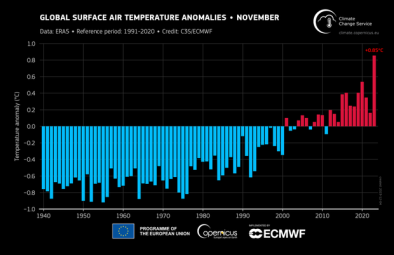Science Source
IPCC AR5 WGII: Climate Change 2014: Impacts, Adaptation, and Vulnerability
The Working Group II contribution to the Fifth Assessment Report of the Intergovernmental Panel on Climate Change finds:
- Changes in climate have caused impacts on natural and human systems on all continents and across the oceans in recent decades
- Changing precipitation or melting snow and ice are altering hydrological systems, affecting water resources in terms of quantity and quality, in many regions
- Many terrestrial, freshwater, and marine species have shifted their geographic ranges, seasonal activities, migration patterns, abundances, and species interactions in response to ongoing climate change
- Based on many studies covering a wide range of regions and crops—that negative impacts of climate change on crop yields have been more common than positive impacts
- At present the worldwide burden of human ill-health from climate change is relatively small compared with effects of other stressors and is not well quantified
- Differences in vulnerability and exposure arise from non-climatic factors and from multidimensional inequalities often produced by uneven development processes
- Impacts from recent climate-related extremes, such as heat waves, droughts, floods, cyclones, and wildfires, reveal significant vulnerability and exposure of some ecosystems and many human systems to current climate variability
- Climate-related hazards exacerbate other stressors, often with negative outcomes for livelihoods, especially for people living in poverty
- Violent conflict increases vulnerability to climate change
- Adaptation is becoming embedded in some planning processes, with more limited implementation of responses
- Adaptation experience is accumulating across regions in the public and private sector and within communities; governments at various levels are starting to develop adaptation plans and policies and to integrate climate-change considerations into broader development plans
- Responding to climate-related risks involves decision making in a changing world, with continuing uncertainty about the severity and timing of climate-change impacts and with limits to the effectiveness of adaptation
- Adaptation and mitigation choices in the near term will affect the risks of climate change throughout the 21st century
- Assessment of risks in the WGII AR5 relies on diverse forms of evidence. Expert judgment is used to integrate evidence into evaluations of risks
- Uncertainties about future vulnerability, exposure, and responses of interlinked human and natural systems are large
- Increasing magnitudes of warming increase the likelihood of severe, pervasive, and irreversible impacts
- The overall risks of climate change impacts can be reduced by limiting the rate and magnitude of climate change
For more, see report below
Related Content
Headline

Feb 15, 2024 | Climate Nexus Hot News
Amazon Could Reach Tipping Point By Midcentury
Headline

Jan 16, 2024 | Climate Nexus Hot News
2023 Smashes Hottest Year Record
Headline

Dec 7, 2023 | Climate Nexus Hot News
It’s Official - 2023 Is World's The Hottest Year On Record
Headline

Dec 7, 2023 | Climate Nexus Hot News
Earth Veering Closer To Dangerous Tipping Points


